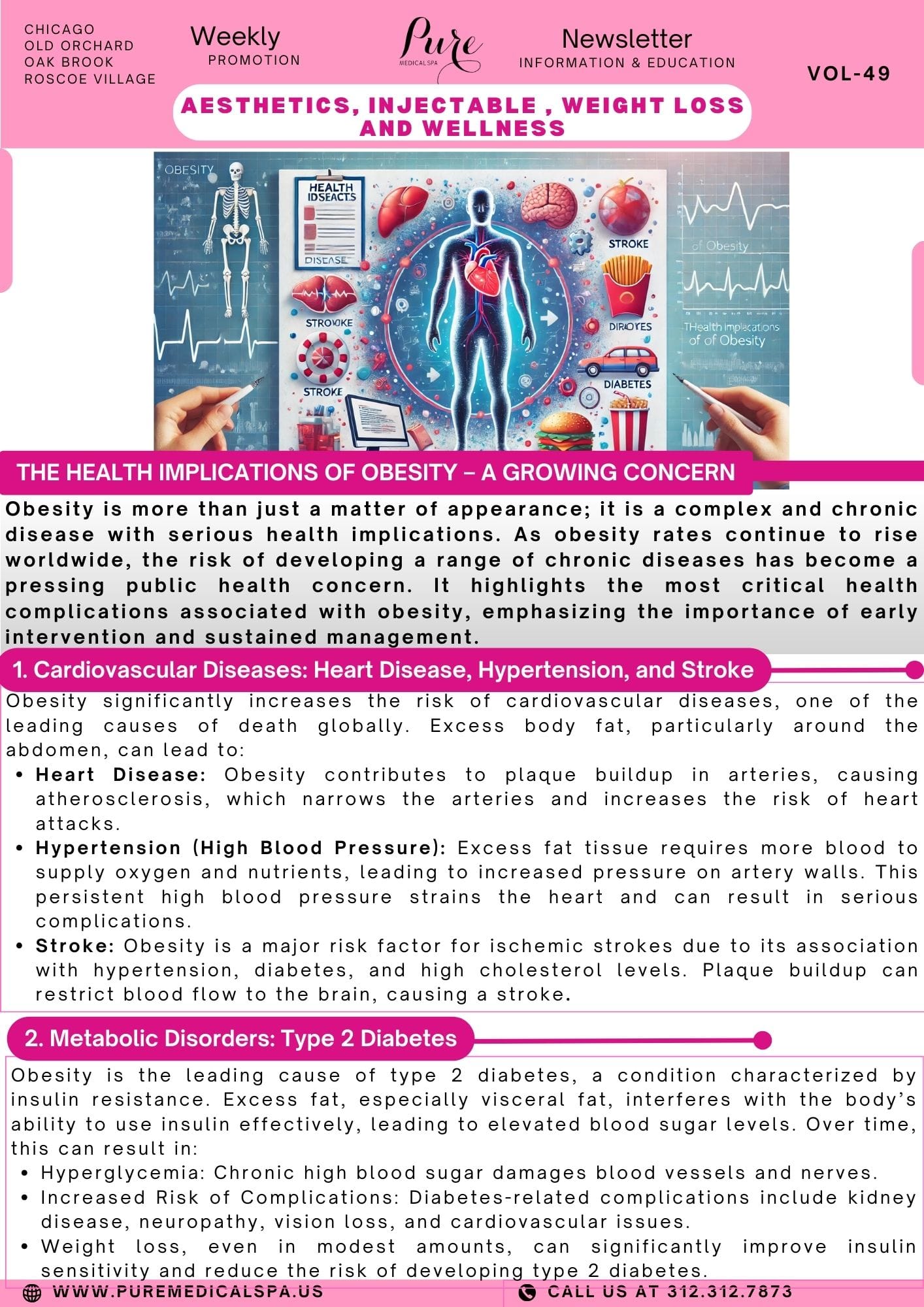Obesity is more than just a matter of appearance; it is a complex and chronic disease with serious health implications. As obesity rates continue to rise worldwide, the risk of developing a range of chronic diseases has become a pressing public health concern. This newsletter highlights the most critical health complications associated with obesity, emphasizing the importance of early intervention and sustained management.
- Cardiovascular Diseases: Heart Disease, Hypertension, and Stroke
Obesity significantly increases the risk of cardiovascular diseases, one of the leading causes of death globally. Excess body fat, particularly around the abdomen, can lead to:
- Heart Disease: Obesity contributes to plaque buildup in arteries, causing atherosclerosis, which narrows the arteries and increases the risk of heart attacks.
- Hypertension (High Blood Pressure): Excess fat tissue requires more blood to supply oxygen and nutrients, leading to increased pressure on artery walls. This persistent high blood pressure strains the heart and can result in serious complications.
- Stroke: Obesity is a major risk factor for ischemic strokes due to its association with hypertension, diabetes, and high cholesterol levels. Plaque buildup can restrict blood flow to the brain, causing a stroke.
- Metabolic Disorders: Type 2 Diabetes
Obesity is the leading cause of type 2 diabetes, a condition characterized by insulin resistance. Excess fat, especially visceral fat, interferes with the body’s ability to use insulin effectively, leading to elevated blood sugar levels. Over time, this can result in:
- Hyperglycemia: Chronic high blood sugar damages blood vessels and nerves.
- Increased Risk of Complications: Diabetes-related complications include kidney disease, neuropathy, vision loss, and cardiovascular issues.
Weight loss, even in modest amounts, can significantly improve insulin sensitivity and reduce the risk of developing type 2 diabetes.
- Cancer Risks: Breast, Colon, and Endometrial Cancers
Research shows a strong correlation between obesity and an increased risk of certain cancers:
- Breast Cancer: Particularly in postmenopausal women, obesity raises estrogen levels, increasing the risk of hormone-sensitive breast cancer.
- Colon Cancer: Excess body fat can cause inflammation and insulin resistance, both of which contribute to the development of colorectal cancer.
- Endometrial Cancer: Obesity-related hormonal imbalances, especially elevated estrogen levels, increase the likelihood of endometrial cancer (cancer of the uterine lining).
Regular screenings and maintaining a healthy weight are essential preventive measures.
- Respiratory Problems: Sleep Apnea, Asthma, and Breathing Issues
Obesity negatively impacts respiratory health by placing additional strain on the respiratory system. This leads to:
- Sleep Apnea: Excess weight around the neck can obstruct airways, causing interrupted breathing during sleep, resulting in fatigue, poor concentration, and increased risk of cardiovascular diseases.
- Asthma: Obesity-related inflammation exacerbates asthma symptoms, making it harder to manage the condition.
- Reduced Lung Capacity: Excess abdominal fat can limit diaphragm movement, reducing lung capacity and making breathing more difficult.
Weight loss can improve respiratory function and alleviate symptoms associated with these conditions.
- Musculoskeletal Issues: Joint Pain, Osteoarthritis, and Reduced Mobility
Carrying excess weight places tremendous stress on the musculoskeletal system, leading to:
- Joint Pain: Increased weight strains joints, particularly in the knees, hips, and lower back, resulting in chronic pain.
- Osteoarthritis: The wear-and-tear effect of carrying extra weight accelerates the breakdown of cartilage, leading to osteoarthritis.
- Reduced Mobility: Obesity can limit physical activity due to discomfort and joint damage, creating a vicious cycle of reduced movement and further weight gain.
Incorporating weight management strategies can significantly reduce joint pain and improve mobility, enhancing the overall quality of life.
Conclusion: The Importance of Prevention and Early Intervention
Obesity’s impact on chronic diseases is profound, affecting nearly every system in the body. However, the good news is that many of these risks can be mitigated through lifestyle changes, including a balanced diet, regular physical activity, and weight management. By addressing obesity as a serious health condition, individuals and healthcare providers can work together to prevent complications, improve outcomes, and enhance overall well-being.
Stay informed, stay active, and prioritize your health—because every step towards a healthier weight is a step towards a healthier life.



